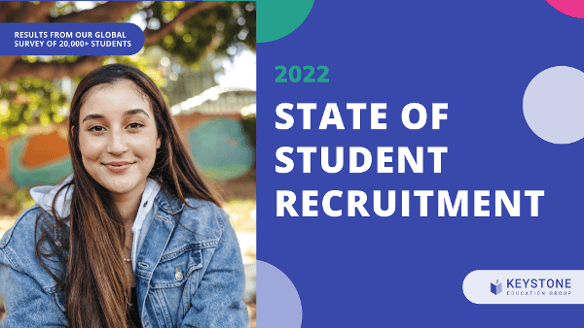Looking for more ways to grow?
Our Higher Ed Marketing Services can help get your institution in front of actively searching students.
Subscribe to get the
latest news and updates
Study abroad: student experiences during COVID-19
 Every year, colleges and universities around the world send their students away on global study abroad and exchange programmers. Studying abroad allows their students to learn a new language, immerse themselves in a different culture, make friends in distant places, and earn credit while gaining a unique perspective on the way others live.
Every year, colleges and universities around the world send their students away on global study abroad and exchange programmers. Studying abroad allows their students to learn a new language, immerse themselves in a different culture, make friends in distant places, and earn credit while gaining a unique perspective on the way others live.
Not all students have the resources to study abroad, but most have the freedom and independence during their four-year experience they may never get again as a working professional. Traveling the world as a college student is an incredible opportunity, whether it’s for a week, semester, or full year.
The COVID-19 pandemic has severely impacted study abroad planning due to heightened health risks, and travel restrictions from country to country. While the digital world has brought us together more than ever thanks to work and study from home life, our international face-to-face connections, and study abroad participation among students have been historically low over the past seven months due to COVID-19.
The enduring popularity of study abroad
The Institute of International Education estimates that prior to March 2020 about 15% of all students enrolled in baccalaureate programs study abroad at some point during their degree program. This number has been steadily rising since the dawn of the new millennium. Over the past two decades, social media and advances in technology have allowed families, faculty, and academic advisors to stay connected from just about anywhere in the world. With the reach of the internet expanding every day, students can research study abroad destinations like never before.
Do students still want to study abroad? (Hint: Yes!)
According to the National Association of Foreign Student Advisers (NAFSA): Association of International Educations, the answer is a resounding “yes.” The world’s largest nonprofit association dedicated to education and exchange conducts extensive independent research on the impact of study abroad and other international experiences. They have found that these programs positively impact on academic, educational, and professional outcome measures.
NAFSA research suggests study abroad improves grade point average, completion and retention rates, language learning, employability and career skills. The once-in-a-lifetime opportunity can also provide a sense of accomplishment and give undecided students more direction in life. There are countless stories of students traveling abroad for a semester, then moving to that same destination to pursue a career.
Students wait closely for travel restrictions to end
A survey conducted as part of Keystone's upcoming State of Student Recruitment report found that a large proportion of students still indicated a strong desire to study abroad despite the pandemic. Due to travel restrictions, virtual student exchange programs have slowly gained popularity, but many students remain patient and waiting for physical restrictions to ease.

From Australia to Singapore
After her first exchange program in Denmark’s Copenhagen Business School (CBS), Ebony (20) from Australia felt motivated and inspired to seek more international experiences, this time in Singapore.
Due to the uncertainty and travel lockdown in Australia, Ebony decided to postpone her exchange plans and defer them to early 2022, when it’s safe to travel again.
As she strategizes her next move, Ebony feels increased communication between exchange partner universities would help address concerns for the future. She wants to know that increased safety measures will be in place to ensure she doesn’t get stranded abroad like several friends have experienced over recent months.
Despite being grounded in Australia for now, Ebony has been enjoying study-from-home life at her home university, Queensland University of Technology (QUT). She says QUT has done great job supporting students by offering automatic extensions for assessment through the entire first semester of 2020. Her professors also maintained constant communication with students through emails, updating them on how teaching and social distancing policies were changing by the day. Ultimately, she looks forward to increase social opportunities, on-campus teaching and her next exchange in a post-pandemic world but is happy to wait until it is safe to resume these activities again.

From China to Norway & Norway to Manchester
Gloria Jinghan (19) from China planned to study abroad in Norway for the summer, and return to London to begin her second year in the Fall 2020 semester. She stayed in Norway through summer and is currently living there, but plans to return to London in January if the situation gets better. However, as of October 2020, London is experiencing a second wave of the COVID-19 virus. She says her online academic study hasn't changed much, but she was scheduled to perform a concert that has been postponed due to social distancing restrictions.
Gloria finds virtual networking and online social events very beneficial for students’ mental health. These digital interactions help her feel more connected to her university, regardless of where she is in the world. She thinks these type of events have made a huge difference to her experience during the pandemic.

Norway-native, Brage (21) was preparing to start his final year at the University of Manchester, when news of COVID-19 reached a global audience. Since all his classes were moved online, he stayed in Norway to study from home.
Brage would like to see all group work assignments canceled or adapted, as he feels it's difficult to communicate with students living in multiple time zones. He looks forward to returning to UofM to complete his degree program in January.
Russia to London
Maria Artamonova (20) from Russia had plans to return to King’s College London when her travel was postponed. She’s currently living in Norway, but plans to return to London before 2021 despite the surging coronavirus cases. She’s realistic about the institution's ability to plan. With all the uncertainty in today’s world, it would be extremely difficult to plan for an entire semester, particularly for the international population.
What does this mean for higher ed?
After speaking with hundreds of students during the pandemic, we’ve learned communication is key. From taking classes online to planning a semester abroad, informed students are empowered students..
Despite a year of pandemic, the popularity of study abroad programs will endure because they add significant value to the student experience. Institutions must maintain their international relationships with other institutions, update their students on the educational format, and keep their communities safe, whether on-campus, online, or abroad.
